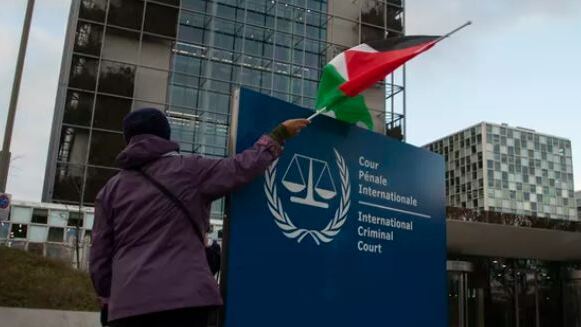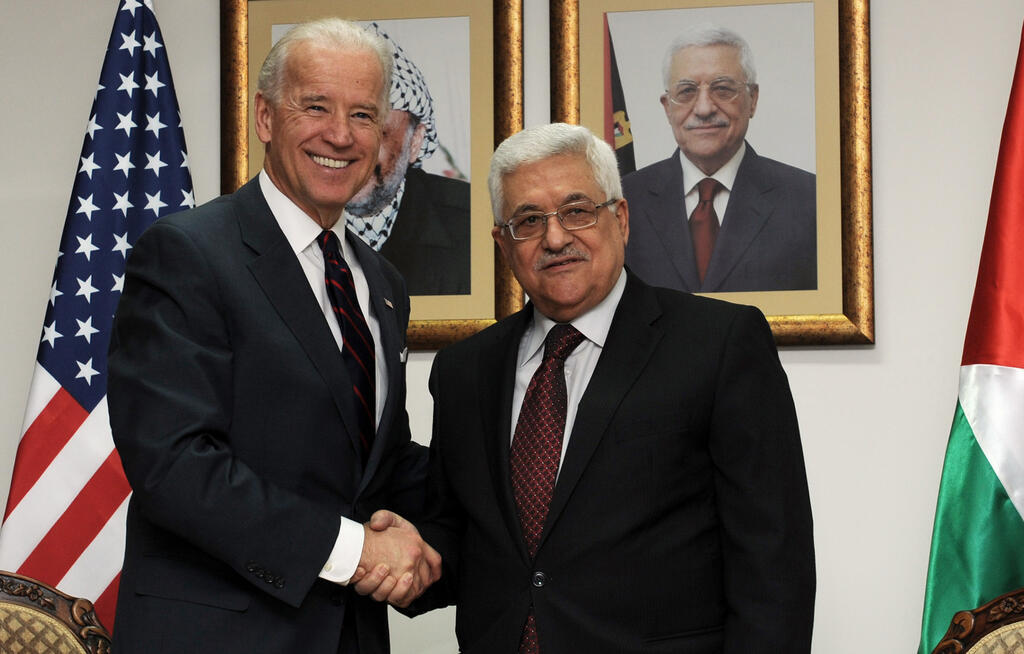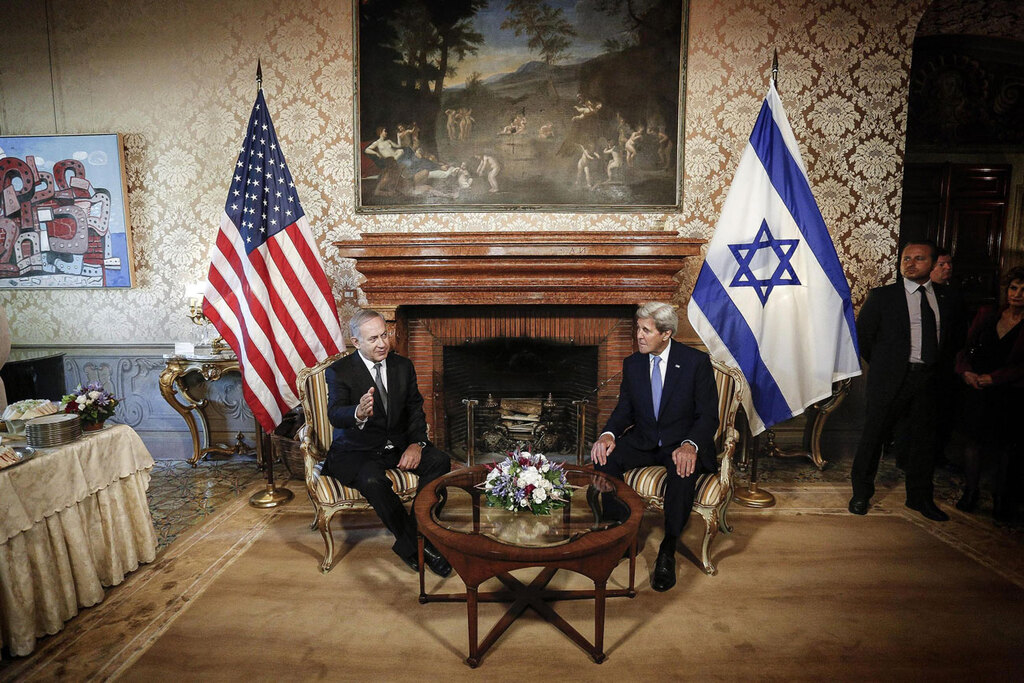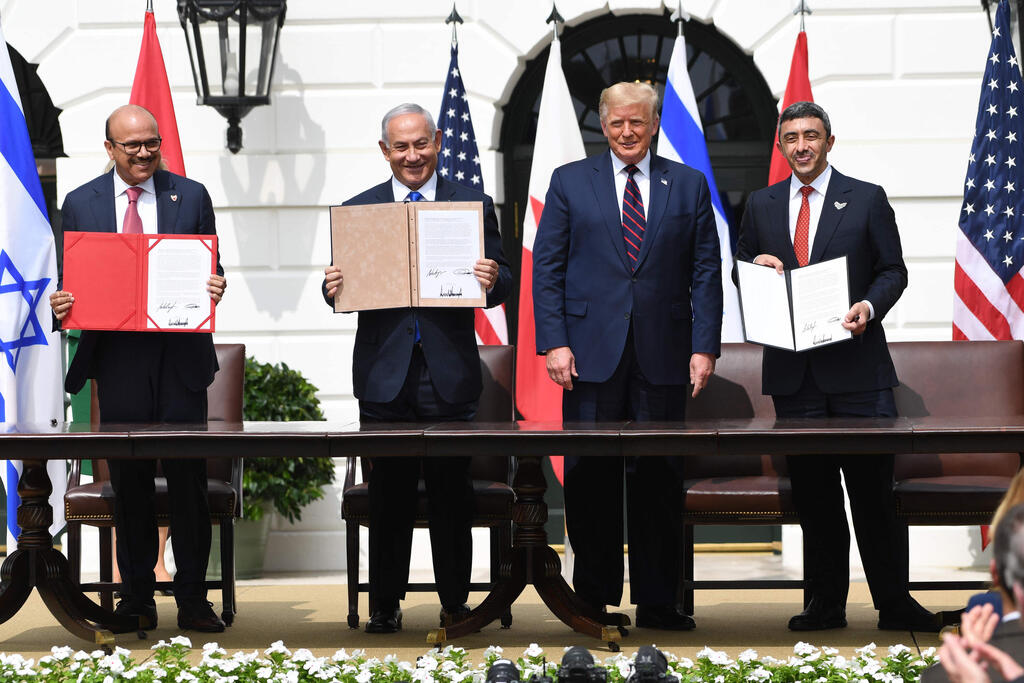The Palestinians began their moves against Israel at the International Criminal Court in January 2015. They lit the flame, clad themselves in endless patience - they call it legal steadfastness - and waited. And now that forbearance has paid off with the announcement of potential war crimes probes.
It was clear to them that international law was intimately tied to the map of global power. Indeed, two weeks after U.S. President Joe Biden entered the White House, when political tides were more in their favor, the plan came to fruition.
4 View gallery


A protester waves a Palestinian flag outside the International Criminal Court at The Hague
(Photo: AP)
There is no reason to marvel at the courage of the International Criminal Court judges who waited to publish their ruling until the U.S. announced that it was "re-examining" the push by Donald Trump's administration for personal sanctions against them over an investigation into the actions of American soldiers in Afghanistan.
Not that anyone was in any doubt about it, but the political timing could not be any clearer.
Even if the legal road is long, the decision by the Hague puts the Palestinian issue back on the international agenda and at the forefront of Israeli discourse after years of marginalization.
4 View gallery


Then-U.S. vice president Joe Biden meeting with Palestinian President Mahmoud Abbas in Ramallah in 2010
(Photo: AP)
In less than a year, Israel has shifted from a situation of unprecedented American normalization of the settlements (remember Psagot Winery's "Pompeo" wine?) and near-West Bank annexation to the possibility of those involved in the settlement enterprise being investigated as war criminals.
With a pendulum that is swinging so fast, Israelis need to focus.
Since the 2014 Gaza war and former U.S. secretary of state John Kerry's failure to create serious negotiations between Israel and the Palestinians, we have been in a state of repression and ambiguity.
A policy of ambiguity has never been a particularly good look. It includes a lot of typical Israeli "truthiness" but under the circumstances it was the least bad option.
4 View gallery


Prime Minister Benjamin Netanyahu meeting with then-secretary of state John Kerry in 2016
(Photo: EPA)
The Palestinians themselves are divided, with half of them under Hamas rule in Gaza. Meanwhile, Israeli politics is moving more and more to the right, a reflection of the fear felt by many Israelis of a radical change in the status quo.
In recent years we have teetered on the brink of another Gaza war dozens of times. We always pulled back in favor of a dubious settlement with Hamas, but that was far preferable to bloodshed.
West Bank annexation, which would undoubtedly have weakened Israel's opening gambit on the day after Trump, was halted and the crisis with the Palestinian Authority over its stipends to terrorists was somehow resolved (although they are still paying the terrorists).
These band-aids held as long as the Palestinians were weak, divided and sidelined by the Arab and global agenda, but when that situation changed they were never going to be enough to stem the bleeding.
The next Israeli government - if there ever is one - will have to define its outline for future relations with the Palestinians and stand by it.
If the Israeli endgame does indeed include Palestinian statehood, it has to be said publicly and the conditions for its existence must be specified in a way that will not lead to a Hamastan - or worse, a Palestinian Syria - within a few years.
And if this is not the case, Israel has to stand behind this decision too. It must state where Palestinian autonomy is headed and what it sees as the nature of its relations with Gaza.
It would be a mistake to deal with The Hague solely as a legal issue.
4 View gallery


L-R: Bahrain FM Abdullatif al-Zayani, PM Benjamin Netanyahu, U.S. President Donald Trump, and Emirati FM Abdullah bin Zayed Al-Nahyan at the signing of the Abraham Accords at the White House, Sept. 2020
(Photo: AFP)
The Palestinians, after four years of being schooled by Donald Trump and a year of having their Arab brethren turn their backs, understand that the wind is blowing in a new direction and that they must take advantage of the moment, just as Israel has taken advantage of the past four years.
Unlike in the past, the Palestinians are no longer waiting for the outcome of Israel's upcoming elections. And not just because they are exhausted.
They are conducting a dialogue with Israel only at the micro level, just the bare minimum to keep afloat. Instead, they have moved the conversation about the future of the conflict back to the world stage.

